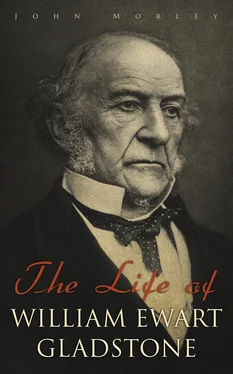Mr. Biscoe, his classical tutor, was a successful lecturer on Aristotle, especially on the Rhetoric. With Charles Wordsworth, son of the master of Trinity at Cambridge, and afterwards Bishop of Saint Andrews, he read for scholarship, apparently not wholly to his own satisfaction. While still an undergraduate, he writes to his father (Nov. 2, 1830), 'I am wretchedly deficient in the knowledge of modern languages, literature, and history; and the classical knowledge acquired here, though sound, accurate, and useful, yet is not such as to complete an education.' It looked, in truth, as if the caustic saying of a brilliant colleague of his in later years were not at the time unjust, as now it would happily be, that it was a battle between Eton and education, and Eton had won.
Mr. Gladstone never to the end of his days ceased to be grateful that Oxford was chosen for his university. At Cambridge, as he said in discussing Hallam's choice, the pure refinements of scholarship were more in fashion than the study of the great masterpieces of antiquity in their substance and spirit. The classical examination at Oxford, on the other hand, was divided into the three elastic departments of scholarship and poetry, history, and philosophy. In this list, history somewhat outweighed the scholarship, and philosophy was somewhat more regarded than history. In each case the examination turned more on contents than on form, and the influence of Butler was at its climax.
CHARACTER OF OXFORD TEACHING
If Mr. Gladstone had gone to Oxford ten years earlier, he would have found the Ethics and the Rhetoric treated, only much less effectively, in the Cambridge method, like dramatists and orators, as pieces of literature. As it was, Whately's common sense had set a new fashion, and Aristotle was studied as the master of those who know how to teach us the right way about the real world. 36Aristotle, Butler, and logic were the new acquisitions, but in none of the three as yet did the teaching go deep compared with modern standards. Oxford scholars of our own day question whether there was even one single tutor in 1830, with the possible exception of Hampden, who could expound Aristotle as a whole—so utterly had the Oxford tradition perished. 37
The time was in truth the eve of an epoch of illumination, and in these epochs it is not old academic systems that the new light is wont to strike with its first rays. The summer of 1831 is the date of Sir William Hamilton's memorable exposure, 38in his most trenchant and terrifying style and with a learning all his own, of the corruption and 'vampire oppression of Oxford'; its sacrifice of the public interests to private advantage; its unhallowed disregard of every moral and religious bond; the systematic perjury so naturalised in a great seminary of religious education; the apathy with which the injustice was tolerated by the state and the impiety tolerated by the church. Copleston made a wretched reply, but more than twenty years passed before the spirit of reform overthrew the entrenchments of academic abuse. In that overthrow, when the time came, Mr. Gladstone was called to play a part, though hardly at first a very zealous one. This was not for a quarter of a century; for, as we shall soon see, both the revival of learning and the reform of institutions at Oxford were sharply turned aside from their expected course by the startling theological movement that now proceeded from her venerable walls.
What interests us here is not the system but the man; and never was vital temperament more admirably fitted by its vigour, sincerity, conscience, compass, for whatever good seed from the hand of any sower might be cast upon it. In an entry in his diary in the usual strain of evangelical devotion (April 25, 1830) is a sentence that reveals what was in Mr. Gladstone the nourishing principle of growth: 'In practice the great end is that the love of God may become the habit of my soul, and particularly these things are to be sought;—1. The spirit of love. 2. Of self-sacrifice. 3. Of purity. 4. Of energy.' Just as truly as if we were recalling some hero of the seventeenth or any earlier century, is this the biographic clue.
Gladstone constantly reproaches himself for natural indolence, and for a year and a half he took his college course pretty easily. Then he changed. 'The time for half-measures and trifling and pottering, in which I have so long indulged myself, is now gone by, and I must do or die.' His really hard work did not begin until the summer of 1830, when he returned to Cuddesdon to read mathematics with Saunders, a man who had the reputation of being singularly able and stimulating to his pupils, and with whom he had done some rudiments before going into residence at Christ Church. In his description of this gentleman to his father, we may hear for the first time the redundant roll that was for many long years to be so familiar and so famous. Saunders' disposition, it appears, 'is one certainly of extreme benevolence, and of a benevolence which is by no means less strong and full when purely gratuitous and spontaneous, than when he seems to be under the tie of some definite and positive obligation.' Dr. Gaisford would perhaps have put it that the tutor was no kinder where his kindness was paid for, than where it was not.
CATHOLIC EMANCIPATION
The catholic question, that was helping many another and older thing to divide England from Ireland, after having for a whole generation played havoc with the fortunes of party and the careers of statesmen, was now drawing swiftly to its close. The Christ Church student had a glimpse of one of the opening scenes of the last act. He writes to his brother (Feb. 6th, 1829):—
I saw yesterday a most interesting scene in the Convocation house. The occasion was the debate on the anti-catholic petition, which it has long been the practice of the university to send up year by year. This time it was worded in the most gentle and moderate terms possible. All the ordinary business there, is transacted in Latin; I mean such things as putting the question, speaking, etc., and this rule, I assure you, stops many a mouth, and I dare say saves the Roman catholics many a hard word. There were rather above two hundred doctors and masters of arts present. Three speeches were made, two against and one in favour of sending up the petition. Instead of aye and no they had placet and non-placet , and in place of a member dividing the House, the question was, “ Petitne aliquis scrutinium? ” which was answered by “ Peto! ” “ Peto! ” from many quarters. However, when the scrutiny took place, it was found that the petition was carried by 156 to 48.... After the division, however, came the most interesting part of the whole. A letter from Peel, resigning the seat for the university, was read before the assembly. It was addressed to the vice-chancellor and had arrived just before, it was understood; and I suppose brought hither the first positive and indubitable announcement of the government's intention to emancipate the catholics.
A few days later, Peel accepted the Chiltern Hundreds, and after some deliberation allowed himself to be again brought forward for re-election. He was beaten by 755 votes to 609. The relics of the contest, the figures and the inscriptions on the walls, soon disappeared, but panic did not abate. On Gladstone's way to Oxford (April 30, 1829), a farmer's wife got into the coach, and in communicative vein informed him how frightened they had all been about catholic emancipation, but she did not see that so much had come of it as yet. The college scout declared himself much troubled for the king's conscience, observing that if we make an oath at baptism, we ought to hold by it. 'The bed-makers,' Gladstone writes home, 'seem to continue in a great fright, and mine was asking me this morning whether it would not be a very good thing if we were to give them [the Irish] a king and a parliament of their own, and so to have no more to do with them. The old egg-woman is no whit easier, and wonders how Mr. Peel, who was always such a well-behaved man here, can be so foolish as to think of letting in the Roman catholics.' The unthinking and the ignorant of all classes were much alike. Arthur Hallam went to see King John in 1827, and he tells his friend how the lines about the Italian priest (Act III. Sc. 1) provoked rounds of clapping, while a gentleman in the next box cried out at the top of his voice, 'Bravo! Bravo! No Pope!' The same correspondent told Gladstone of the father of a common Eton friend, who had challenged him with the overwhelming question, 'Could I say that any papist had ever at any time done any good to the world?' A still stormier conflict than even the emancipation of the catholics was now to shake Oxford and the country to the depths, before Mr. Gladstone took his degree.
Читать дальше









![William Frith - John Leech, His Life and Work. Vol. 1 [of 2]](/books/747171/william-frith-john-leech-his-life-and-work-vol-thumb.webp)


![William Frith - John Leech, His Life and Work, Vol. 2 [of 2]](/books/748201/william-frith-john-leech-his-life-and-work-vol-thumb.webp)